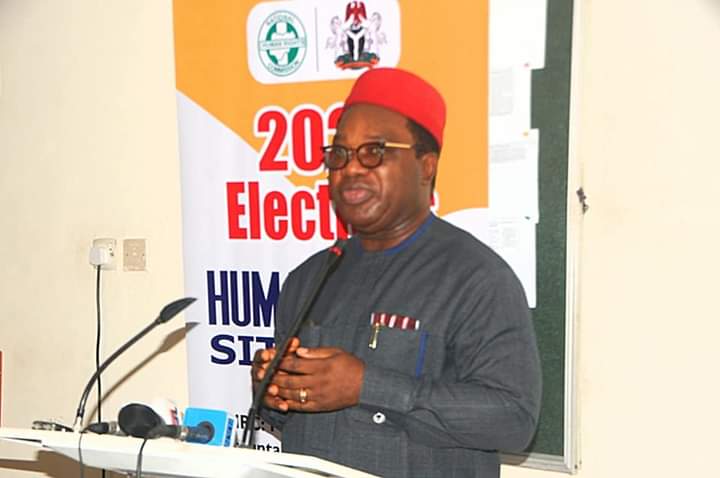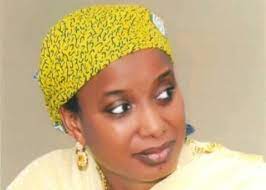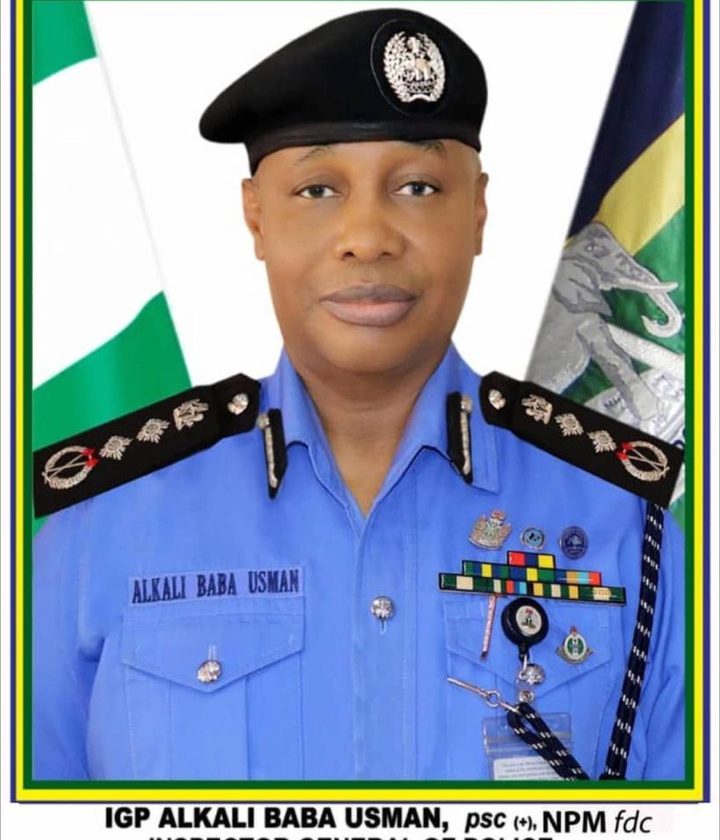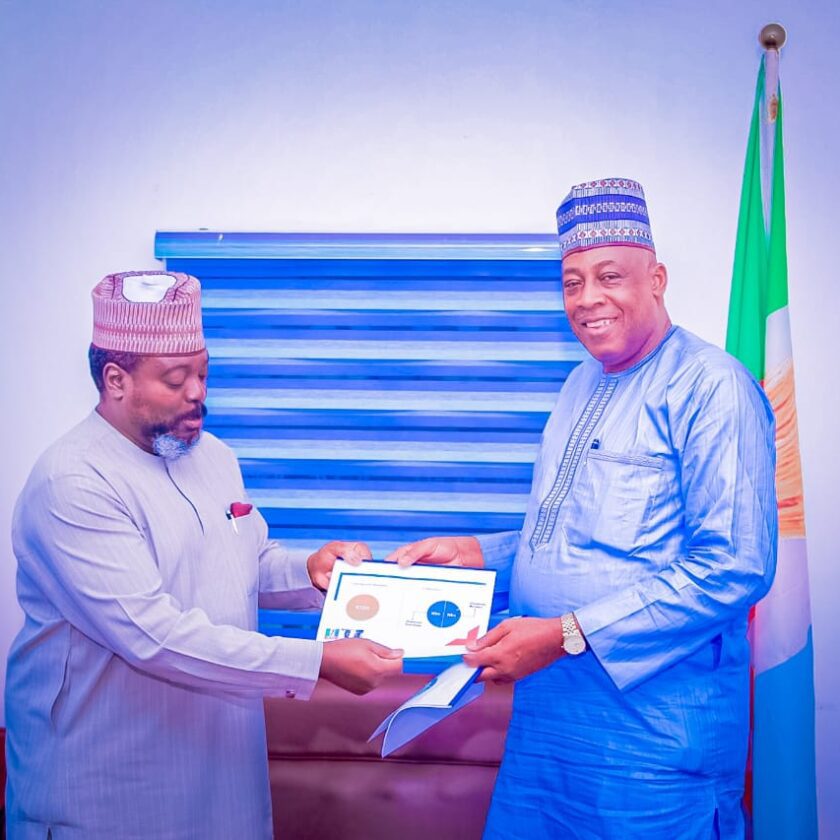The National Human Rights Commission has called on the Independent National Electoral Commission to ensure that Nigerians who were disenfranchised on last Saturday elections are able to vote in the rescheduled elections.
This was contained in preliminary statement of the 2023 Presidential and National Assembly elections presented by the Executive Secretary, National Human Rights Commission NHRC,Bar Tony Ojukwu SAN at NHRC Situation Room in Abuja on Sunday 26th February,2023.
Ojukwu said disenfranchisement is a violation of the right to vote and could be a major trigger for election violence and impacts on the legitimacy and acceptability of election results.
He said everything should be done to ensure that Nigerians who trooped out in their millions to vote are afforded the opportunity to do so.And it’s constitutional responsibility of the electoral umpire to ensure prompt uploads of results of elections into its election results portals for transparency and integrity in the electoral process.
IThe National Human Rights Commission (NHRC) commended Nigerians for turning out in unprecedented numbers to exercise their right to vote as guaranteed by the Constitution of the Federal Republic of Nigeria and regional and international human rights instruments which Nigeria is party to.
Recall that the National Human Rights Commission as part of its mandate to promote and protect human rights, launched its 2023 Election project “Mobilising Voters for Election (MOVE)” to ensure access, participation and accountability in the electoral process.
The Commission on 25th of February 2023 mobilised and deployed 800 Human Rights Monitors across the 36 states and the Federal Capital Territory to monitor the exercise of the right to vote and the level of access accorded to Nigerians to exercise these rights. The Commission also monitored the conduct of law enforcement and security personnel to note critical incidents relating to human rights violations occurring during and after the elections.
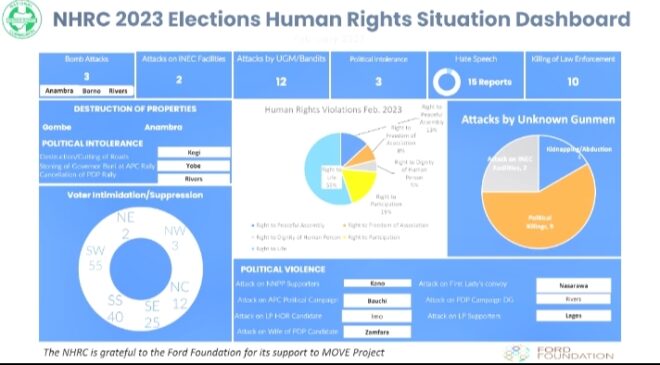
A Human Rights Situation Room was set up at the Commission’s headquarters to monitor the conduct of the elections and receive complaints of human rights violation from the 36 states and the FCT.
The Preliminary statement read in part:
1.5 The National Human Rights Commission hereby presents its preliminary findings at the Presidential and National Assembly Elections.
2.0 Pre-Election Environment
2.1 Prior to the elections the Commission in a bid to create a human rights compliant environment, carried out several activities under the MOVE project. These include
1. Monitoring of PVC collection across the 36 states of the federation and the FCT,
2. Monitoring of hate speeches and setting up of a National Hate Speech Register
3. Presidential and gubernatorial town halls on human rights and the 2023 elections.
4. Consultations with law enforcement and security agencies and issued Guidelines on the Role of the Law Enforcement and Security Agencies in the Protection of Voters’ Access and Participation at Elections.
2.2 Pre-election activities
The 2023 elections saw one the longest pre-election campaigns periods, stretching from early 2022 and leading to heavily contested primaries. The formal campaigns which began in September 2022 featured divisive messages centering on regional and religious sentiments.
3.0 Logistics:
3.1. The reports from our monitors across the 36 states and the calls received in the Human Rights Situation Room revealed that INEC officials and electoral materials arrived late in many polling units causing delays in accreditation and voting in many polling units across the country. In 43% of over 1000 polling units monitored by NHRC monitors, counting of votes started late and in some places went on late into the night and even early on Sunday morning.
3.2 Our Monitors also noted that in some polling units, INEC officials did not come with essential electoral materials, including stamps and inks. In 5 polling units in Maiduguri, BVAS which is an essential element of the voting process was not available.
1. 1.00pm – 2.00pm – 4%
2. 2.00pm – 3.00pm – 18%
3. 3.00pm – 4.00pm – 46%
4. After 4.00pm – 34%
3.3 The Commission notes with concern that INEC call lines and feedback platforms could not be reached at various attempts by our Monitors in spite of various attempts.
4.0 Voter Turn-out and Disenfranchisement
4.1 Our monitors noted with satisfaction, the commendable turn-out of voters across the country. This is a marked improvement from previous presidential and National Assembly elections in 2019. Once again, the Commission commends Nigerians for their patriotism.
4.2 The Commission notes with regret, the disenfranchisement of Nigerians across Lagos, Bayelsa and Kogi states
5.0 BVAS
5.1 Our report shows 92% success with accreditation using the Bimodal Voter Accreditation System (BVAS). Just as in off cycle elections in the states, BVAS has shown
5.2 We however note the reported cases of inability or failure to upload election results at most of the polling units after counting, even in city centres like Abuja and Lagos.
6.0 Voting Process
6.1 Accreditation of voters:
The NHRC monitors reported that the accreditation process was smooth. 92% of voters were successfully accredited while 8% were unsuccessful.
6.2 Voting:
6.2.1 Our monitors reported that the process of voting was challenging in some parts of the country due to the following factors:
1. Upsurge in the number of voters without a corresponding increase in the number of polling personnel meant that the voting process is unduly prolonged and heightening vulnerabilities to electoral violence and malpractices.
2. Late arrival of personnel and materials meant that voting commenced late and voters and polling officials were exhausted.
6.2.2 Our Human Rights Monitors also noted that the reassignment of polling units did not achieve its purpose as some Polling Units had just few voters and others had an upsurge of voters. Some of the voters who were reassigned to new polling units could not locate them on time and those who did could not access the new polling units due to distance and lack of transportation.
7.0 Electoral Violence
7.1 Incidents of electoral violence were directly reported by our Monitors in 3% of the polling units observed across the country. In Kogi state, a party agent was allegedly shot by an opposition party thugs.
7.2 In Lagos and Rivers states, there were reported incidents of ballot snatching and attacks on voters and INEC officials.
7.3 Voter Suppression
There were various reports of attempts to intimidate voters and INEC officials by party supporters and thugs. These reports were received from states such as Rivers, Delta, Lagos, Kogi and Imo. NHRC monitors reported that in 8% of polling units, accreditation and voting were disrupted for various reasons, including the malfunctioning of election equipment and incidents of violence.
7.4 Vote buying
Vote buying was reported in 42 locations across the country by our Human Rights Monitors, particularly in Lagos, Imo, Sokoto, Jigawa, Edo, Nasarawa, Jigawa and Kogi states. Voters were offered money or other incentives to influence their votes.
8.0 Law Enforcement Agents
Generally, it was observed that the conduct of law enforcement and security personnel deployed to ensure a peaceful election was commendable. However, the Commission notes:
a. The inability of law enforcement and security agents to stop violence at polling units.
b. Cases of human rights violations attributed to security agents including the use of force and extra-judicial killings.
c. Crowd control: It was reported that in some polling units, the crowd was overwhelming and the security personnel were few in number.
Also in her recommendations, NHRC charged INEC to Re-appraise its logistics strategy to ensure that:
1. Materials and personnel arrive on time during the governorship and houses of assembly election in March.
2. Materials which are essential instruments for the exercise of the right to vote are available. INEC must ensure that voting materials are complete and enough for the huge size of electorates.
4. Revamp its feedback platforms including call lines to enable Nigerians reach INEC to directly report on situations on the electoral process.
The National Human Rights Commission also called on the Nigerian Police Force and other law enforcement and security agencies to:
1. Ensure security of electoral materials and personnel in the rescheduled elections and the forthcoming gubernatorial and House of Assembly elections.
2. Continue to maintain political neutrality and impartiality in election operations.
3. Arrest and prosecute all cases of political violence, including attacks and snatching of ballot boxes and materials.
4. Manage and contain using human rights based approaches, case of post-election violence and ensure the protection of lives and properties as we enter into a critical period in the electoral process.
The National Human Rights Commission further tasked all Nigerians to remain calm, patriotic and loyal to the laws of Nigeria. Nigerians should eschew violence of all kinds and see the elections as a contest that will produce winners and losers.
“We also call on Nigerians to repeat the huge turnout for the governorship and House of Assembly elections.
“The National Human Rights Commission calls on all politicians, traditional and religious leaders and citizens to eschew hate speeches, incitement to violence and divisive rhetoric in this critical moment of the transition programme. The NHRC will invoke its protective mandate to hold any Nigerian no matter his or her status in the society accountable for any violence or threat of violence that erupts as a result of their speeches, incitements and reckless statements
“In conclusion, NHRC will continue to monitor the electoral process closely and provide further updates and issue its final statement on the conduct of the election in due course”.


